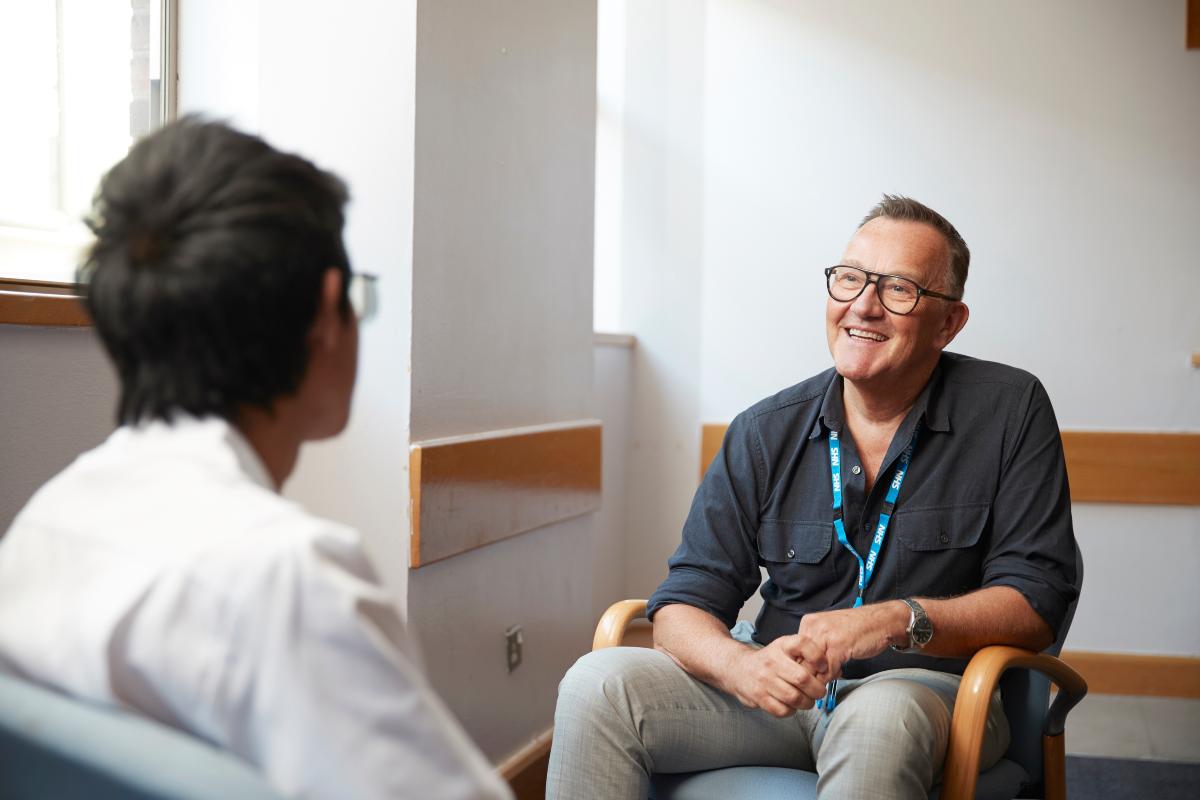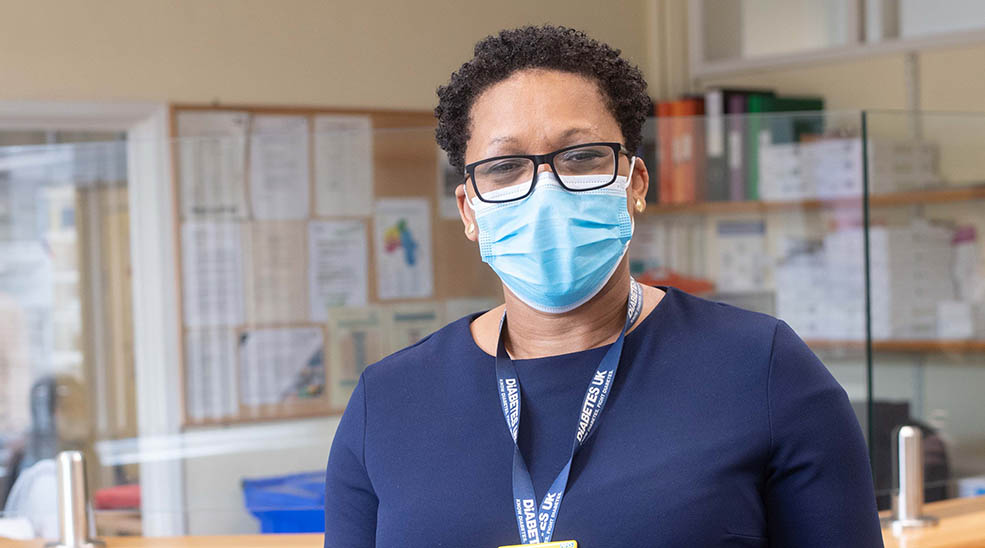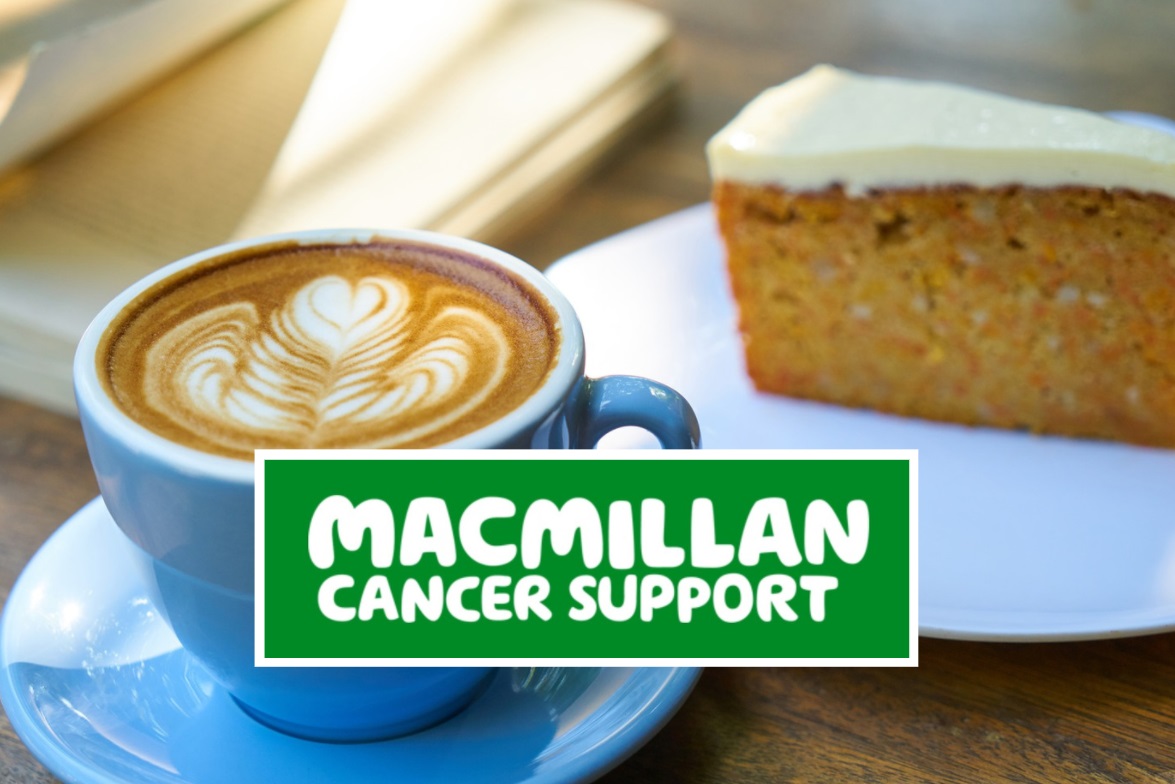
Treatment for cancer can be a difficult experience
You may feel pain, fatigue and feelings of anxiety and worry.
We offer emotional, psychological and practical support, including groups and one-to-one sessions, to help you manage these issues.

You may feel pain, fatigue and feelings of anxiety and worry.
We offer emotional, psychological and practical support, including groups and one-to-one sessions, to help you manage these issues.
The following information is provided to newly diagnosed cancer patients at St Bartholomew's Hospital. However, many of the documents are relevant to patients being treated at our other hospitals.
The packs, which cover things like financial support and talking therapies, are usually provided by your clinical team, but you can also download all of the documents here.
Additional support, such as support groups and classes, are available on this page.
Complementary therapies are a range of treatments used to help support our patients and improve their quality of life. This could include an increased ability to relax and a better sense of wellbeing. Symptoms such as constipation, pain, insomnia, fatigue, breathlessness, muscular aches and anxiety may be helped this way too.
The use of plant based essential oils, which may be either inhaled or used as massage oil. We can also create an inhaler called an aroma-stick which you can take away with you and use as often as you would like to. The oils in the inhalers can be blended to suit specific needs, for example to help with nausea.
A type of foot or hand massage with gentle pressures at specific points. You will only need to remove your shoes and socks for this treatment.
The use of light pressure on the body, directly onto the skin. Specific parts of the body may be treated. We also offer a form of massage called ‘biodynamic’ that aims to help on a combined physical, emotional and spiritual level.
Therapists use light pressure on specific parts of the body, through clothing.
Therapists make use of breathing and muscle relaxation techniques and positive thoughts and images.
The therapist uses gentle hand movements on the body, through clothing. There are frequent pauses of a few minutes which allow the body to respond to the treatment.
The therapist places their hands in a series of positions on or near the body. There is no massage or manipulation. You will be fully clothed and either sitting on a chair or lying down on a couch.
The service is available for Barts Health cancer and palliative care patients. Patients may be seen as inpatients or outpatients.
Therapies are offered for four to six sessions in outpatient clinics. We appreciate that needs change and so we are happy for you to be re-referred as necessary. In-patients may be seen multiple times.
Your key worker, nurse specialist or any member of your medical team can refer you into the service. Following referral, a member of the Complementary Therapies Service Team will contact you in order to arrange an initial appointment.
The service is free of charge. If you would like to support the Complementary Therapies Service, donations can be made to Special Purpose Fund 8404 at Barts Charity.
Call 020 8539 5522 and use extension 5840. A therapist will be happy to talk about the service further and answer any questions you may have.
Anyone affected by cancer can access expert information covering the entire range of cancers, treatments, psychosocial issues, lifestyle issues and financial matters at one of our Macmillan information centres located at our hospitals. Details can be found using the 'Visit a Macmillan information centre' section on this page.
Personalised care and support is a holistic approach to patient care, supporting patients to live well with and beyond their cancer diagnosis. The service also supports patients to be more in control of their recovery.
As part of the cancer team at Barts Health we have Macmillan cancer support workers who work alongside our specialist nurses and consultants. They support people who have a cancer diagnosis, are currently undergoing treatment, and those patients who are living with or beyond cancer.
Macmillan cancer support workers work with patients and carers to identify and address any worries or concerns after a cancer diagnosis, helping individuals to take control of their care and to live well. Support is available face-to-face in one of our Macmillan information centres or on the ward, over the telephone or via email.
These are offered after an initial diagnosis and after an acute period of treatment has been completed, e.g. surgery, chemotherapy or radiotherapy. It is a time to talk with a support worker to discuss any concerns. The focus is the person as a whole not just their illness. Individuals decide how much information they would like to share about their current situation and, with the support of the support worker, a care plan is agreed.
The following concerns are examples of what might be discussed as part of a HNA :
The Macmillan team at Barts Health have created a number of videos with information for patients, carers and family members:
The following films were made by a group of people who are living with or beyond cancer. The process brought them together to discover the importance of peer support and the power of personal stories.
Group support is available for people with any type of cancer and their friends and families before, during or after treatment.
Every group provides an opportunity to talk to other people who are in a similar situation to you and to share experiences.
Groups offer a safe space to express emotions you might not want to share with your friends and family.
You might learn from those a little way ahead of you in their journey and develop your own strategies for coping.
|
Group name |
Venue |
Frequency of meetings |
Contact |
|---|---|---|---|
|
Primary breast cancer support group |
Maggie's Barts |
Third Tuesday of every month, 1-2pm |
Email or call 0203 904 3448 |
| Secondary cancer support group | Maggie's Barts | First Tuesday of every month, 1-2pm | Email or call 0203 904 3448 |
|
Men's cancer support group |
Coming soon |
Email or call 020 3904 3448 |
|
|
Ovarian cancer support group |
2nd Monday of the month 3:30 – 5:00pm |
Email or call 020 3904 3448 |
|
|
Young women’s support group |
1st and 3rd Thursday of each month 12-1.30pm |
Email or call 020 3904 3448 |
|
|
Friends and family support group |
2nd Thursday of each month 12-1.30pm |
Email or call 020 3904 3448 |
|
|
LGBTIQ+ support group |
1st Thursday of each month 3pm-4pm |
Email or call 020 3904 3448 |
|
|
Testicular support group |
St Bartholomew's, virtual meet up |
Monthly in the evening |
|
|
Prostate support sroup |
Whipps Cross, virtual meet up |
Monthly |
TBC |
|
Breast cancer support group |
Whipps Cross |
On hold |
Call Tina Donoghue, 020 8535 6643 |
|
Bladder cancer support group |
Whipps Cross |
Coming soon |
Call Sharan Hatch, 0208 5356790 |
|
Chronic GvHD support group |
Virtual group accessed via Starleaf |
Every 2 months |
|
|
Talking Heads |
On hold |
On hold |
Email Marianne Miller |
A diagnosis of cancer and the experiences that follow can be understandabl y distressing . You may find it helpful to access the support of friends, family and peers as well as organisations such as Macmillan, Maggie’s and other cancer charities . Your cancer team are also there to support you, particularly the cancer clinical nurse specialists who are trained to provide psychological support .
Sometimes, however, where people experience ongoing distress that is hard to manage, additional input from psychological specialists can be useful.
Cancer Psychological Services is a team of art psychotherapists , practitioner psychologists , an existential psychotherapist and a liaison psychiatrist who offer a specialist psychological service for people affected by cancer, at any point during their care at Barts Health . We are embedded in the cancer centre and work closely alongside cancer doctors and nurses, to meet the psychological needs of patients at any point, from diagnosis through treatment and onwards .
Our service is available to people with any cancer diagnosis, at any stage of their care and up to one year post completion of treatment . We can help:
with the management of cancer treatment and physical symptoms
explore the impact o f cancer and treatments on aspects of your life such as your important relationships , your body and how you feel about yourself
support you in decision making
Our session s can be face-to-face, by telephone or by video cal l. We routinely offer short term interventions and the number of sessions you require will be agreed between you and the psychological specialist you meet (usually up to a bout 6-8) .
If you think you would like to speak with a psychological professional , please talk to your clinical nurse specialist or another member of your cancer team in the first instance who can discuss with you what might be most appropriate and what options are available.
We also run Fear of Cancer Recurrence / Progression workshops that are open to anyone who would like to learn strategies to manage the understandable fears and worries about cancer coming back .
Art therapy is a form of psychotherapy that uses visual art as a way of expressing and working through thoughts and feelings . Some things are difficult to put into words and art therapists are trained to enable patients to use art materials as a way of exploring a range of issues . There can be a lot of talking too: how the art making and the verbal discussion combine in art therapy is determined by the needs of each individual . Art therapy is not an art lesson, and it is not necessary to have any previous experience or expertise in art. Nor does the art therapist judge whether the art is ‘good’ or ‘bad ’, or make a clinical diagnosis based on the work produced.
Art therapy is provided through the generous support of the Corinne Burton Memorial Trust .
Psychology is the study of people: how people think, feel and behave . Practitioner psychologists use psychological approaches to help you understand and manage troubling thoughts, feelings, and behaviour s . Psycholog ists provide cancer-focused talking therapy where you would be working towards a goal / something you would like to be different in your life . Sessions tend to be a combination of talking and learning new strategies to help manage difficulties . It can also provide a space to process and explore difficult thoughts and feelings about what's happening to you .
Existential Psychotherapy is a type of talking therapy that supports people to make sense of anxieties and uncertainties that are a fundamental part of life and existence, such as death, fear of the unknown and the meaning of life . Existential psychotherapy is not goal focused . It works with the present rather than delving into the past, although previous life experiences are considered and may help provide insight .
Psychiatry is the study of mental health problems and their diagnosis, management and prevention. Liaison psychiatry is the specialty of psychiatry that deals with the link between people’s physical and mental health . Liaison psychiatrists are medical doctors who support p eople who need specialist help, including taking medication to help with mood, or accessing mental health support from outside th e hospital . This could be because their distress is acute, or they need specialist care that Barts Health does not provide .
Other resources that can help with your mental health and wellbeing :
Macmillan – Your Emotions is a brief, clear guide to understanding and addressing feelings about cancer
The Cancer Care Map is a simple, online resource that aims to help you find cancer support services in your local area wherever you are in the UK
All London boroughs have access to talking therapies . You can speak with your GP to find out more on:
Mind is a national charity providing advice and support about mental health problems .
If you need to speak to someone about mental health issues, you can contact the Samaritans at any time .

We welcome advice and feedback from the people who use our services.

Here for you
The Maggie's Centre at St Bartholomew's Hospital provides free practical, emotional and social support to people with cancer and their families.

Visit a Macmillan centre in any of our hospitals
They offer a free drop-in service for anyone affected by cancer. You can access confidential one-to-one support, information booklets, welfare and benefits advice and details of other local and national services.
The Royal London Hospital
Stepney Way entrance, Ground Floor
Tel: 020 3765 8995